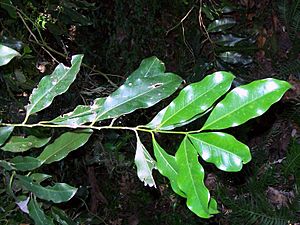White bark facts for kids
Quick facts for kids White bark |
|
|---|---|
 |
|
| Endiandra compressa, leaves | |
| Scientific classification |
|
| Kingdom: | Plantae |
| Clade: | Tracheophytes |
| Clade: | Angiosperms |
| Clade: | Magnoliids |
| Order: | Laurales |
| Family: | Lauraceae |
| Genus: | Endiandra |
| Species: |
E. compressa
|
| Binomial name | |
| Endiandra compressa C.T.White
|
|
| Script error: The function "autoWithCaption" does not exist. | |
Script error: No such module "Check for conflicting parameters".
The Endiandra compressa, also known as the white bark tree, is a type of tree that grows in the rainforests of eastern Australia. You can often find it growing near streams in valleys. This tree naturally grows from the Nambucca River in New South Wales all the way up to Iron Range National Park in northern Queensland.
Contents
What Does the White Bark Tree Look Like?
This tree can grow very tall, reaching up to 30 metres high. Its trunk can become quite wide, about 75 centimetres across. Older trees might have a wide, flared base, called buttresses.
Bark and Branches
The bark of the white bark tree is usually light grey or almost white. This is how it gets its common name! Its smaller branches are smooth and green at their tips.
Leaves
The leaves are simple, meaning each leaf is a single blade. They grow alternately along the stem. They are shaped like a spearhead, from 8 to 18 centimetres long and 3 to 5 centimetres wide. Both the top and bottom of the leaves are shiny green. You can easily see the veins on both sides of the leaf.
Flowers
Creamy or yellow flowers grow in small clusters called panicles. These clusters appear from where the leaves join the stem, or sometimes from bare spots on the branches. The flowers usually bloom from November to December.
Fruit and Seeds (Reproduction)
The fruit of the white bark tree ripens in January. It's a large, fleshy fruit called a drupe, similar to a peach or plum. It measures 3 to 5 centimetres across and is black or bluish-black when ripe. The fruit is mostly round but looks a bit flattened on the sides. This flattened shape is why the tree is named compressa. Inside each fruit, there is one large seed. To help the seed grow, you should remove the fleshy part of the fruit before planting it.
Who Uses the White Bark Tree?
The Chaetocneme porphyropis butterfly is known to feed on the leaves of the white bark tree. This means the tree provides an important food source for these butterflies.
 | Precious Adams |
 | Lauren Anderson |
 | Janet Collins |

